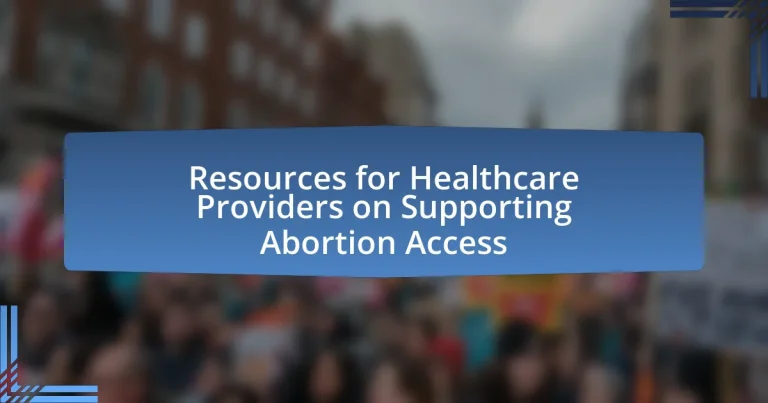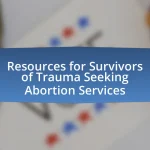The article focuses on resources available for healthcare providers to support abortion access, highlighting the importance of comprehensive training programs, clinical guidelines, and advocacy toolkits. Key organizations such as the American College of Obstetricians and Gynecologists and the National Abortion Federation offer essential resources that equip providers with the necessary knowledge and skills to deliver safe and legal abortion services. The article also discusses the critical role healthcare providers play in ensuring patient autonomy and improving health outcomes, as well as the challenges they face, including legal restrictions and social stigma. Additionally, it outlines best practices for patient-centered care and effective communication strategies to enhance support for individuals seeking abortion services.
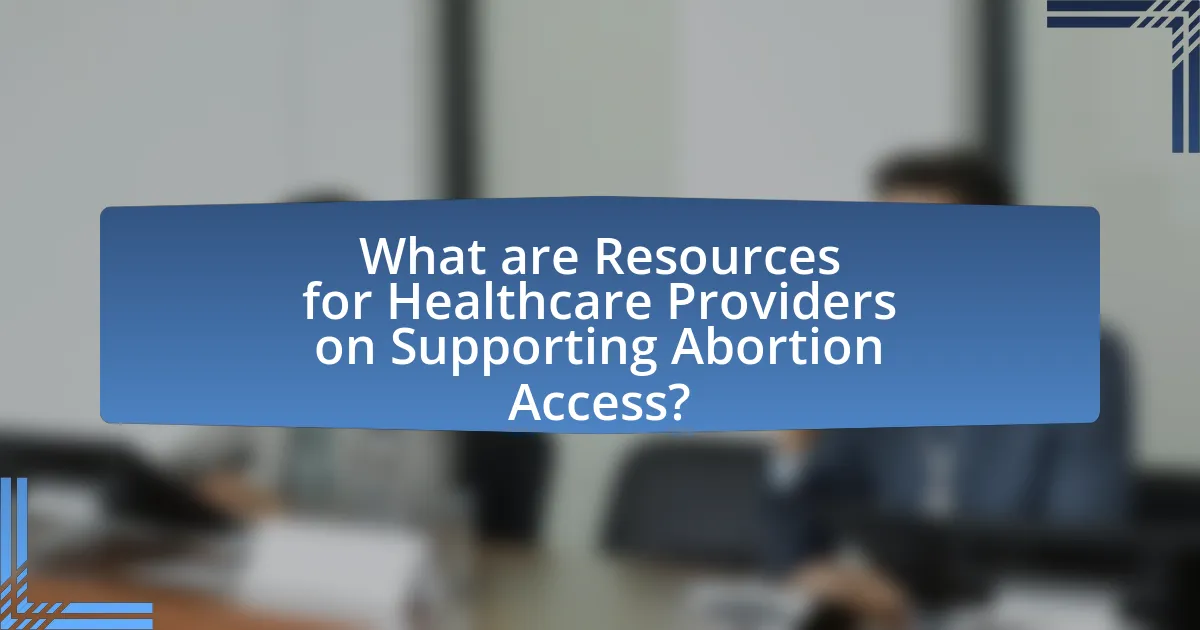
What are Resources for Healthcare Providers on Supporting Abortion Access?
Resources for healthcare providers on supporting abortion access include comprehensive training programs, clinical guidelines, and advocacy toolkits. Organizations such as the American College of Obstetricians and Gynecologists (ACOG) provide clinical guidelines that outline best practices for abortion care, ensuring providers are equipped with the necessary knowledge and skills. Additionally, the National Abortion Federation offers training and resources that focus on the provision of safe and legal abortion services. Advocacy toolkits from groups like Planned Parenthood help healthcare providers navigate legal and policy frameworks, empowering them to support patients effectively. These resources are essential for maintaining access to abortion services and ensuring that providers can offer informed, compassionate care.
Why is it important for healthcare providers to support abortion access?
Healthcare providers must support abortion access to ensure comprehensive reproductive healthcare and uphold patient autonomy. Supporting abortion access allows providers to offer safe, legal, and medically appropriate options for individuals facing unplanned pregnancies, which is crucial for their physical and mental health. Research indicates that access to abortion services is linked to better health outcomes; for instance, a study published in the American Journal of Public Health found that women who are denied abortions are more likely to experience economic hardship and adverse health effects. By advocating for abortion access, healthcare providers contribute to reducing health disparities and promoting equitable healthcare for all individuals.
What role do healthcare providers play in abortion access?
Healthcare providers play a critical role in abortion access by offering medical services, counseling, and information to patients seeking abortions. They are responsible for performing the procedures, ensuring patient safety, and providing follow-up care. According to the Guttmacher Institute, healthcare providers are essential in facilitating access to safe and legal abortions, particularly in areas where such services may be limited. Their training and adherence to medical guidelines ensure that patients receive appropriate care, which is vital for both physical and mental health outcomes.
How does supporting abortion access impact patient care?
Supporting abortion access significantly enhances patient care by ensuring that individuals can make informed choices about their reproductive health. When healthcare providers support abortion access, they contribute to a comprehensive approach to reproductive healthcare that respects patient autonomy and addresses diverse medical needs. Research indicates that access to safe and legal abortion services reduces the incidence of unsafe procedures, thereby decreasing maternal morbidity and mortality rates. For instance, a study published in the American Journal of Public Health found that states with more restrictive abortion laws have higher rates of maternal deaths compared to those with broader access. This evidence underscores the critical role that supporting abortion access plays in safeguarding patient health and well-being.
What types of resources are available for healthcare providers?
Healthcare providers have access to various resources that support abortion access, including clinical guidelines, training programs, legal resources, and patient education materials. Clinical guidelines, such as those from the American College of Obstetricians and Gynecologists, provide evidence-based practices for safe abortion care. Training programs, often offered by organizations like the National Abortion Federation, equip providers with the necessary skills and knowledge. Legal resources, including state-specific laws and regulations, help healthcare providers navigate the legal landscape surrounding abortion. Additionally, patient education materials assist providers in informing patients about their options and the procedures involved. These resources collectively enhance the ability of healthcare providers to offer comprehensive abortion care.
What educational materials can healthcare providers utilize?
Healthcare providers can utilize a variety of educational materials, including clinical guidelines, patient education brochures, online training modules, and evidence-based research articles. Clinical guidelines, such as those from the American College of Obstetricians and Gynecologists, provide standardized protocols for abortion care. Patient education brochures help inform patients about their options and the procedures involved, ensuring they make informed decisions. Online training modules, often offered by professional organizations, enhance providers’ skills and knowledge regarding abortion services. Evidence-based research articles, published in peer-reviewed journals, offer insights into best practices and the latest findings in reproductive health. These materials collectively support healthcare providers in delivering comprehensive and informed abortion care.
How can healthcare providers access legal and policy information?
Healthcare providers can access legal and policy information through various resources such as government websites, legal databases, and professional organizations. Government websites, including those of state health departments and the Centers for Disease Control and Prevention, provide up-to-date legal guidelines and policy changes relevant to healthcare practices. Legal databases like Westlaw and LexisNexis offer comprehensive access to case law, statutes, and regulations that affect healthcare delivery. Additionally, professional organizations, such as the American Medical Association, often publish resources and guidelines that summarize legal and policy information pertinent to healthcare providers, ensuring they remain informed about their legal obligations and rights in supporting abortion access.
How can healthcare providers effectively use these resources?
Healthcare providers can effectively use resources for supporting abortion access by integrating evidence-based guidelines into their practice, ensuring they are informed about local laws and regulations, and utilizing educational materials to enhance patient communication. By staying updated on the latest research and best practices, providers can offer accurate information and compassionate care, which is essential for patient trust and informed decision-making. For instance, studies show that when healthcare providers are knowledgeable about abortion services and can communicate this effectively, patients are more likely to seek and receive the care they need.
What strategies can healthcare providers implement to support patients?
Healthcare providers can implement strategies such as offering comprehensive counseling, ensuring access to accurate information, and creating a supportive environment to support patients. Comprehensive counseling involves discussing all available options, including abortion, and addressing emotional and psychological needs, which has been shown to improve patient satisfaction and decision-making (American College of Obstetricians and Gynecologists, 2020). Providing accurate information helps patients make informed choices, as misinformation can lead to anxiety and confusion (Guttmacher Institute, 2021). Additionally, fostering a supportive environment, where patients feel safe and respected, encourages open communication and trust, which is essential for effective healthcare delivery (World Health Organization, 2019).
How can healthcare providers stay updated on abortion access resources?
Healthcare providers can stay updated on abortion access resources by subscribing to reputable medical and public health organizations that focus on reproductive health, such as the American College of Obstetricians and Gynecologists (ACOG) and Planned Parenthood. These organizations regularly publish guidelines, updates, and educational materials regarding abortion access. Additionally, healthcare providers can participate in webinars, attend conferences, and engage in professional networks that discuss current policies and practices related to abortion services. Research indicates that continuous education and networking within these professional communities enhance providers’ knowledge and responsiveness to changes in abortion access (Guttmacher Institute, 2021).
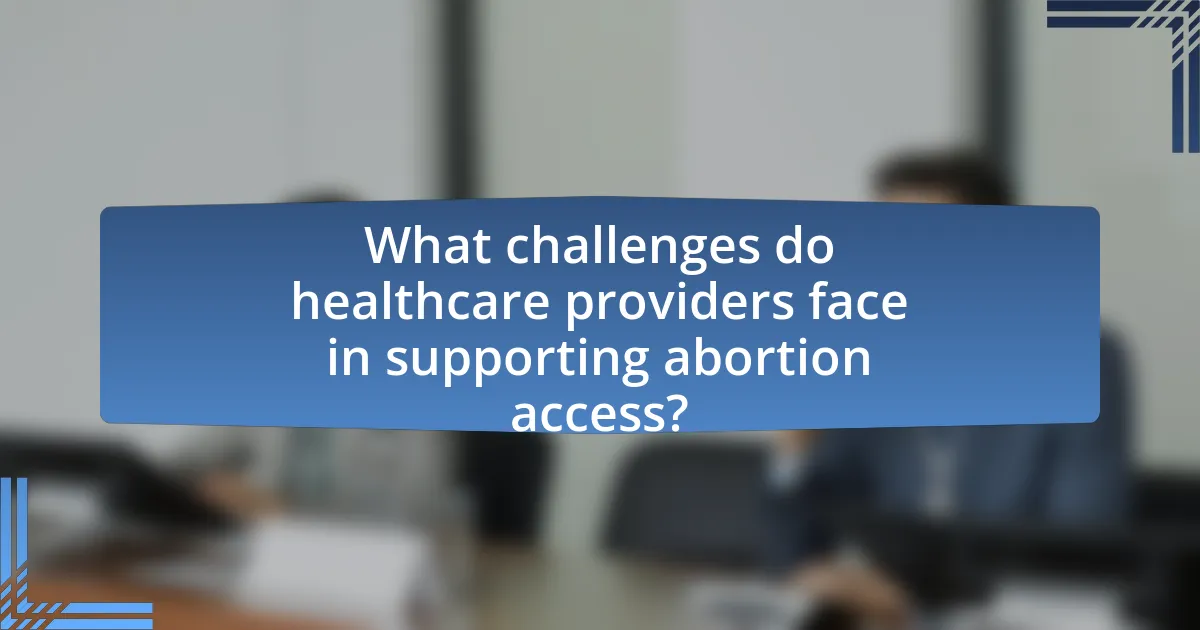
What challenges do healthcare providers face in supporting abortion access?
Healthcare providers face significant challenges in supporting abortion access, primarily due to legal restrictions, stigma, and resource limitations. Legal restrictions vary by state, with some regions imposing strict regulations that limit providers’ ability to offer abortion services, creating barriers to care. Stigma surrounding abortion can lead to a lack of training and support for healthcare professionals, making them hesitant to provide services or refer patients appropriately. Additionally, resource limitations, such as insufficient funding and lack of access to necessary medical facilities, further hinder providers’ ability to support patients seeking abortions. These factors collectively contribute to a complex environment that complicates the provision of abortion services.
What are the common barriers to providing abortion services?
Common barriers to providing abortion services include legal restrictions, lack of funding, and limited access to trained healthcare providers. Legal restrictions often manifest as gestational limits or mandatory waiting periods, which can hinder timely access to care. Financial constraints arise from inadequate insurance coverage for abortion services, leading to out-of-pocket expenses that many patients cannot afford. Additionally, the shortage of trained healthcare providers, particularly in rural areas, limits the availability of safe abortion services, as many practitioners may be unwilling or unable to offer these services due to personal beliefs or lack of training. According to the Guttmacher Institute, 90% of U.S. counties lack an abortion provider, highlighting the significant access issues faced by individuals seeking these services.
How do legal restrictions affect healthcare providers’ ability to support abortion access?
Legal restrictions significantly limit healthcare providers’ ability to support abortion access by imposing regulations that can restrict their practices and patient care options. For instance, laws such as mandatory waiting periods, parental consent requirements, and gestational limits can create barriers that prevent providers from offering timely and comprehensive abortion services. According to the Guttmacher Institute, as of 2021, 19 states have enacted laws that require waiting periods, which can delay access and increase the logistical challenges for patients seeking care. Additionally, some states have implemented targeted regulations of abortion providers (TRAP laws), which impose strict operational standards that can lead to clinic closures, further reducing access to services. These legal frameworks create an environment where healthcare providers may face legal repercussions for offering abortion services, ultimately hindering their ability to support patients effectively.
What social stigma do healthcare providers encounter regarding abortion services?
Healthcare providers encounter significant social stigma regarding abortion services, often facing judgment and discrimination from both the public and their peers. This stigma can manifest in various forms, including negative perceptions about their professionalism and moral integrity, which can lead to isolation within their communities. Research indicates that healthcare professionals who provide abortion services may experience harassment, threats, and even violence, contributing to a hostile work environment. A study published in the American Journal of Public Health highlights that 30% of abortion providers reported experiencing stigma-related harassment, underscoring the pervasive nature of this issue.
How can healthcare providers overcome these challenges?
Healthcare providers can overcome challenges in supporting abortion access by implementing comprehensive training programs that enhance knowledge and skills related to abortion care. Such training equips providers with the necessary clinical competencies and addresses potential biases, ensuring they can offer non-judgmental and informed care. Evidence shows that states with more extensive training and support for healthcare providers report higher rates of abortion access and lower stigma associated with the procedure. Additionally, establishing strong referral networks and partnerships with organizations that advocate for reproductive rights can facilitate access to resources and support for both providers and patients.
What advocacy efforts can healthcare providers engage in?
Healthcare providers can engage in advocacy efforts such as promoting policies that protect and expand access to abortion services. These efforts include participating in public awareness campaigns, collaborating with organizations that support reproductive rights, and providing education to patients about their options. For instance, a study published in the American Journal of Public Health highlights that healthcare providers who advocate for reproductive health policies can significantly influence public opinion and legislative outcomes. By actively engaging in these advocacy efforts, healthcare providers can help ensure that patients have access to safe and legal abortion services.
How can collaboration with organizations enhance support for abortion access?
Collaboration with organizations can enhance support for abortion access by pooling resources, expertise, and advocacy efforts to create a more comprehensive support system. For instance, partnerships between healthcare providers, non-profits, and advocacy groups can lead to increased funding for clinics, improved training for medical staff, and broader outreach to underserved communities. Research from the Guttmacher Institute indicates that states with collaborative networks of organizations tend to have more accessible abortion services, demonstrating that collective action can effectively address barriers to care.
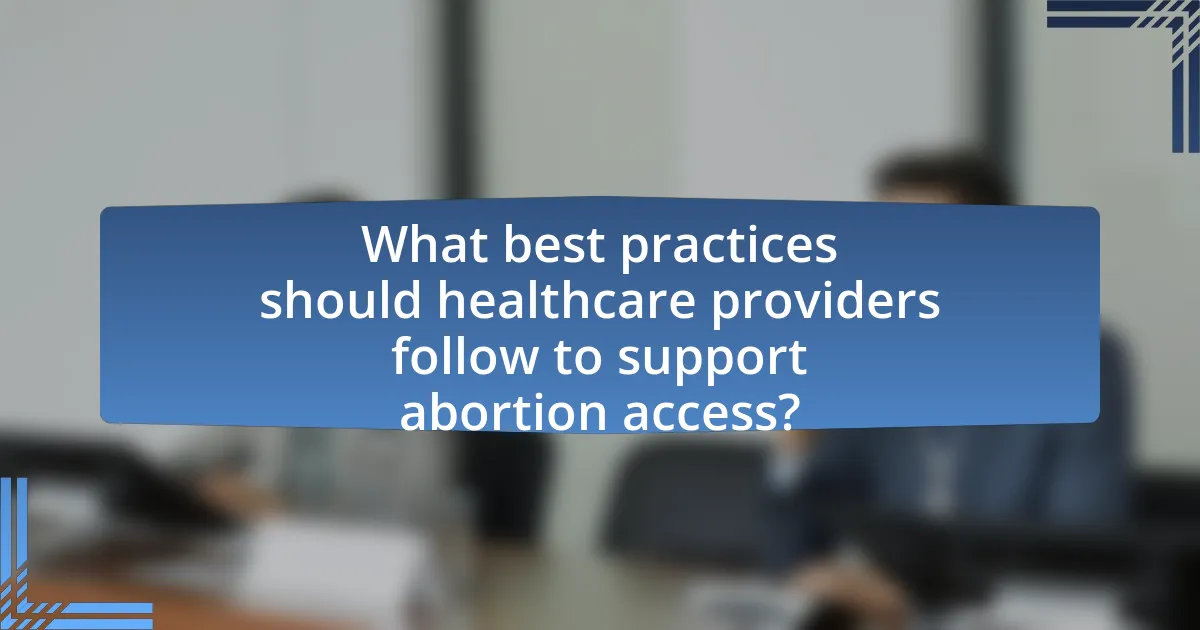
What best practices should healthcare providers follow to support abortion access?
Healthcare providers should implement patient-centered care, ensuring that individuals seeking abortion services receive comprehensive information, respectful treatment, and access to necessary resources. This includes offering clear communication about the procedures, potential risks, and available options, as well as providing referrals to mental health support and financial assistance programs. Evidence shows that states with supportive policies and comprehensive care models report higher patient satisfaction and better health outcomes, reinforcing the importance of these practices in promoting equitable access to abortion services.
What communication strategies are effective in discussing abortion with patients?
Effective communication strategies for discussing abortion with patients include active listening, providing non-judgmental support, and using clear, empathetic language. Active listening allows healthcare providers to understand patients’ concerns and feelings, fostering a trusting environment. Non-judgmental support ensures that patients feel safe to express their thoughts and emotions without fear of stigma. Using clear and empathetic language helps convey complex medical information in an accessible manner, which is crucial for informed decision-making. Research indicates that these strategies enhance patient satisfaction and improve the overall quality of care in sensitive discussions about abortion (American College of Obstetricians and Gynecologists, 2020).
How can healthcare providers create a supportive environment for patients seeking abortion services?
Healthcare providers can create a supportive environment for patients seeking abortion services by ensuring confidentiality, providing comprehensive information, and offering empathetic care. Confidentiality reassures patients that their privacy is respected, which is crucial for building trust. Comprehensive information about the procedure, potential risks, and available options empowers patients to make informed decisions. Empathetic care, characterized by active listening and non-judgmental attitudes, fosters a safe space where patients feel valued and understood. Research indicates that supportive environments significantly improve patient satisfaction and outcomes, highlighting the importance of these practices in healthcare settings.
What resources can healthcare providers recommend to patients considering abortion?
Healthcare providers can recommend several resources to patients considering abortion, including local clinics, national organizations, and online platforms that provide information and support. For instance, Planned Parenthood offers comprehensive services and educational materials about abortion options, while the Guttmacher Institute provides research and data on reproductive health. Additionally, the National Abortion Federation maintains a directory of accredited abortion providers, ensuring patients can access safe and legal services. These resources are validated by their established presence in the reproductive health field and their commitment to providing accurate information and support to individuals facing this decision.
What are the key takeaways for healthcare providers supporting abortion access?
Healthcare providers supporting abortion access should prioritize patient-centered care, ensure comprehensive education on reproductive health, and advocate for policy changes that protect access to abortion services. Patient-centered care involves actively listening to patients’ needs and providing non-judgmental support, which is essential for fostering trust and ensuring informed decision-making. Comprehensive education includes staying informed about the latest medical guidelines and legal frameworks surrounding abortion, enabling providers to offer accurate information and resources. Advocacy for policy changes is crucial, as healthcare providers can influence legislation that affects abortion access, thereby improving healthcare equity. These takeaways are supported by studies indicating that patient satisfaction increases with supportive care environments and that informed providers can significantly impact patient outcomes in reproductive health.
How can healthcare providers ensure they are informed and prepared to assist patients?
Healthcare providers can ensure they are informed and prepared to assist patients by engaging in continuous education and utilizing evidence-based guidelines. Continuous education can include attending workshops, webinars, and conferences focused on reproductive health and abortion care, which keeps providers updated on the latest practices and legal considerations. Utilizing evidence-based guidelines, such as those from the American College of Obstetricians and Gynecologists, helps providers deliver care that aligns with current medical standards and patient needs. Additionally, establishing a network for peer support and consultation can enhance providers’ readiness to address complex patient situations effectively.
What ongoing education opportunities should healthcare providers pursue?
Healthcare providers should pursue ongoing education opportunities such as specialized training in reproductive health, updates on legal and ethical aspects of abortion care, and workshops on patient communication and counseling techniques. These educational avenues enhance providers’ knowledge and skills, ensuring they are equipped to offer comprehensive and compassionate care. For instance, the American College of Obstetricians and Gynecologists (ACOG) offers resources and courses that focus on the latest guidelines and best practices in abortion services, which are crucial for maintaining high standards of care in this sensitive area.
